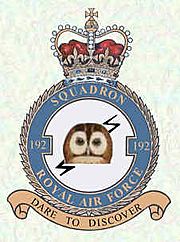No. 192 Squadron RAF facts for kids
Quick facts for kids No. 192 Squadron RAF |
|
|---|---|

Official squadron badge of No. 192 Squadron RAF
|
|
| Active | 5 Sep 1917 – Dec 1918 4 Jan 1943 – 22 Aug 1945 15 Jul 1951 – 21 Aug 1958 |
| Country | |
| Branch | |
| Motto(s) | Dare to Discover |
| Insignia | |
| Squadron Badge heraldry | In front of a flash of lightning, an owl's head affrontée |
| Squadron Codes | DT |
No. 192 Squadron was a special unit of the Royal Air Force, which is the UK's air force. This squadron was active during both the First World War and the Second World War. In the First World War, they trained pilots for night flights. During the Second World War, they had a very important job: they found and jammed enemy radar signals. After these big wars, the squadron continued to gather secret electronic information until it was closed down in 1958.
Contents
History of No. 192 Squadron
Starting in World War I
No. 192 Squadron began on 5 September 1917 in Gainsborough, Lincolnshire. Their main job was to train pilots for flying at night. They used planes called the Royal Aircraft Factory FE.2b and FE.2d. In 1918, the squadron moved to Newmarket, Suffolk. It was then closed down in December 1918, when the war ended.
Reforming for World War II
The squadron started up again on 4 January 1943. It was first known as No. 1474 Flight. Then it became 192 (Special) Squadron. This time, their mission was very different. They used special planes like the Vickers Wellington and de Havilland Mosquito. These planes were changed to find and understand German radar signals. They also flew missions over the Bay of Biscay and the Mediterranean Sea.
In April 1943, the squadron moved to RAF Feltwell. Later that year, they moved again to RAF Foulsham. Here, they joined 100 (Bomber Support) Group. Their job was to fly alongside bomber planes. They would use special equipment to confuse German radars. This helped the bombers stay safer. The squadron was closed down on 22 August 1945, right after the Second World War ended. Its work helped create new units focused on signals and radio warfare.
Starting Up Again in the Cold War
On 15 July 1951, the squadron was formed for a third time at RAF Watton. It was part of the Central Signals Establishment. Even though its role was called Operational Signals Research, the squadron kept doing its main job: gathering ELectronic INTelligence (ELINT). This meant they collected secret electronic signals from other countries.
For these missions, they used planes like the Boeing Washington and the English Electric Canberra. These aircraft were perfect for flying long distances and collecting information. The squadron was finally closed down on 21 August 1958 at Watton. Its work and people were then moved into 51 Squadron.
Aircraft Used by the Squadron
| From | To | Aircraft | Variant |
|---|---|---|---|
| Sep 1917 | Dec 1918 | Royal Aircraft Factory F.E.2 | F.E.2b and 2d |
| Jan 1943 | Feb 1943 | Vickers Wellington | Mks.Ic, III |
| Jan 1943 | Mar 1945 | Vickers Wellington | Mk.X |
| Jan 1943 | Mar 1945 | de Havilland Mosquito | Mk.IV |
| Mar 1943 | Jul 1943 | Handley Page Halifax | Mk.II |
| Jul 1943 | Mar 1944 | Handley Page Halifax | Mk.V |
| Mar 1944 | Aug 1945 | Handley Page Halifax | Mk.III |
| Feb 1945 | Aug 1945 | de Havilland Mosquito | Mk.XVI |
| Aug 1945 | Aug 1945 | Airspeed Oxford | |
| Aug 1945 | Aug 1945 | Avro Anson | Mk.I |
| Jul 1951 | Sep 1952 | de Havilland Mosquito | PR.34 |
| Jul 1951 | Mar 1953 | Avro Lincoln | B.2 |
| Apr 1952 | Feb 1958 | Boeing Washington | B.1 |
| Jan 1953 | Aug 1958 | English Electric Canberra | B.2 |
| Apr 1954 | Apr 1956 | Vickers Varsity | T.1 |
| Jul 1954 | Aug 1958 | English Electric Canberra | B.6 (Mod) |
| Jul 1957 | Aug 1958 | de Havilland Comet | C.2R or R.2 |
See also
- List of Royal Air Force aircraft squadrons
 | Madam C. J. Walker |
 | Janet Emerson Bashen |
 | Annie Turnbo Malone |
 | Maggie L. Walker |

